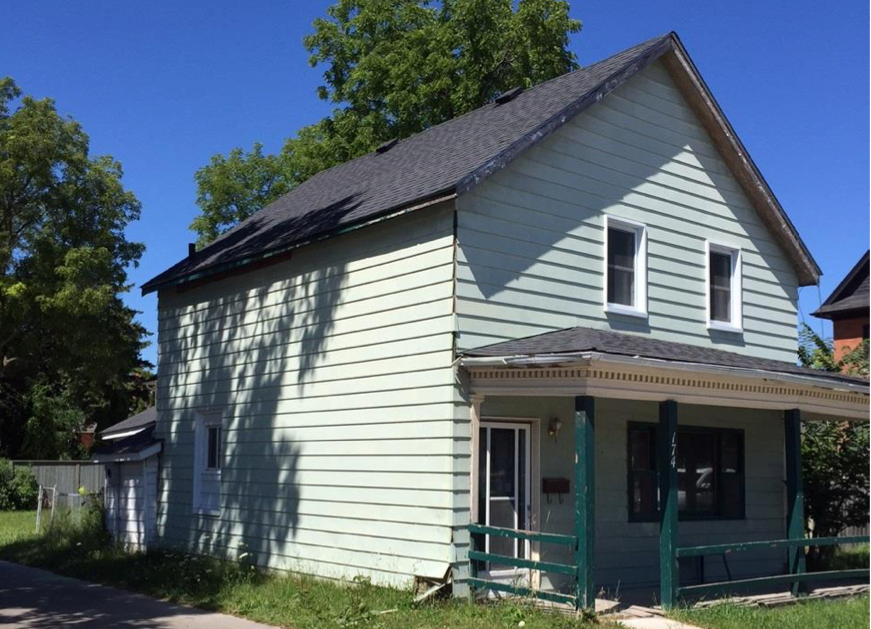A home on St. Paul Street was demolished this week after the province overturned a Town of Collingwood decision to deny the owner’s application for a demolition permit.
The owners of the property launched a successful appeal with the Local Planning Appeal Tribunal (LPAT), which wrapped up on May 17, 2019.
The application to demolish the home, which falls within the heritage district, was originally denied by Collingwood’s heritage committee, then Collingwood council.
But the LPAT decision ruled demolition should be permitted “on the strength of uncontested evidence.”
The owners of 174 St. Paul Street applied to the Collingwood Heritage Committee for a demolition permit for the unoccupied home in April 2018.
While the home wasn’t specifically designated a heritage building, it fell within the boundaries of the Collingwood Downtown Heritage Conservation District, so permission from the Heritage Committee was required for a demolition permit.
At the heritage committee meeting, the owners of the property, also the owners of 124 Ontario Street (Georgian Centre) explained they wanted to tear down the home to make room for more parking for the adjacent commercial property.
At the April 18, 2018 meeting the heritage committee members deferred a decision to allow members time to do research on the property.
At the next meeting on May 16, 2018, the matter was raised again. According to the minutes of that meeting, committee members Ellen Marr Mills and Betty Donaher brought forward concerns about allowing a demolition for the sake of a parking lot.
The minutes stated research done on the property showed “no particular heritage significance.”
Rick Lex, representing the Architecture Conservancy of Ontario, also spoke up at the meeting by suggesting it set a poor precedent to allow buildings in the heritage district to be demolished for parking space.
The committee sent a recommendation to council to deny the application and to request a Heritage Impact Assessment from the property owners.
On July 23, 2018, the former director of planning, Nancy Farrer, brought council a staff report on the property explaining it was within a commercial zone where a parking lot is permitted and there was nothing to identify the building as historically significant, nor was it found to be the home of a Collingwood prominent citizen.
Farrer included an assessment done by a structural engineer with her staff report.
The assessment stated the building structure should be demolished, citing issues like roof leaks, severe settlement (sinking) in the framing, and a deteriorating foundation. The engineer’s report stated the building structure (a mud sill plate foundation) is no longer permitted under the Ontario Building Code.
Council voted to deny the demolition permit in a 6-3 vote with Mayor Sandra Cooper, Councillor Mike Edwards, and Councillor Kevin Lloyd voting against the motion.
The LPAT hearing took place Jan. 24, 2019 in Collingwood.
The decision, which was released in May, includes conclusions drawn through a Heritage Impact Assessment, which stated the proposed plan to demolish the house and build a parking lot would not negatively impact the adjacent significant cultural heritage resources or the overall heritage district.
Two engineering reports, from June 28, 2018, and Dec. 7, 2018, by Barill Engineering Limited concluded the structure should be demolished as it was structurally unsound, were also included in the LPAT proceeding.
Further, the decision released by LPAT stated the town’s heritage district plan describes heritage buildings as well-crafted and having good design features. The plan describes non-heritage buildings as ranging from well-crafted modern designs to utilitarian boxes.
The plan does not include a specific list of heritage buildings.
The LPAT designated Dan Currie, a consultant with MHBC specializing in cultural heritage and land-use planning to provide an opinion on the matter. MHBC is the company hired by the property owner to undertake a heritage impact assessment on the building.
According to the hearing decision document, Currie confirmed the building was in poor condition and had lost a lot of its original attributes. It was his opinion the property was not a heritage resource.
Currie also suggested a parking lot would not detract from the surrounding area nor would it negatively impact the heritage district.



